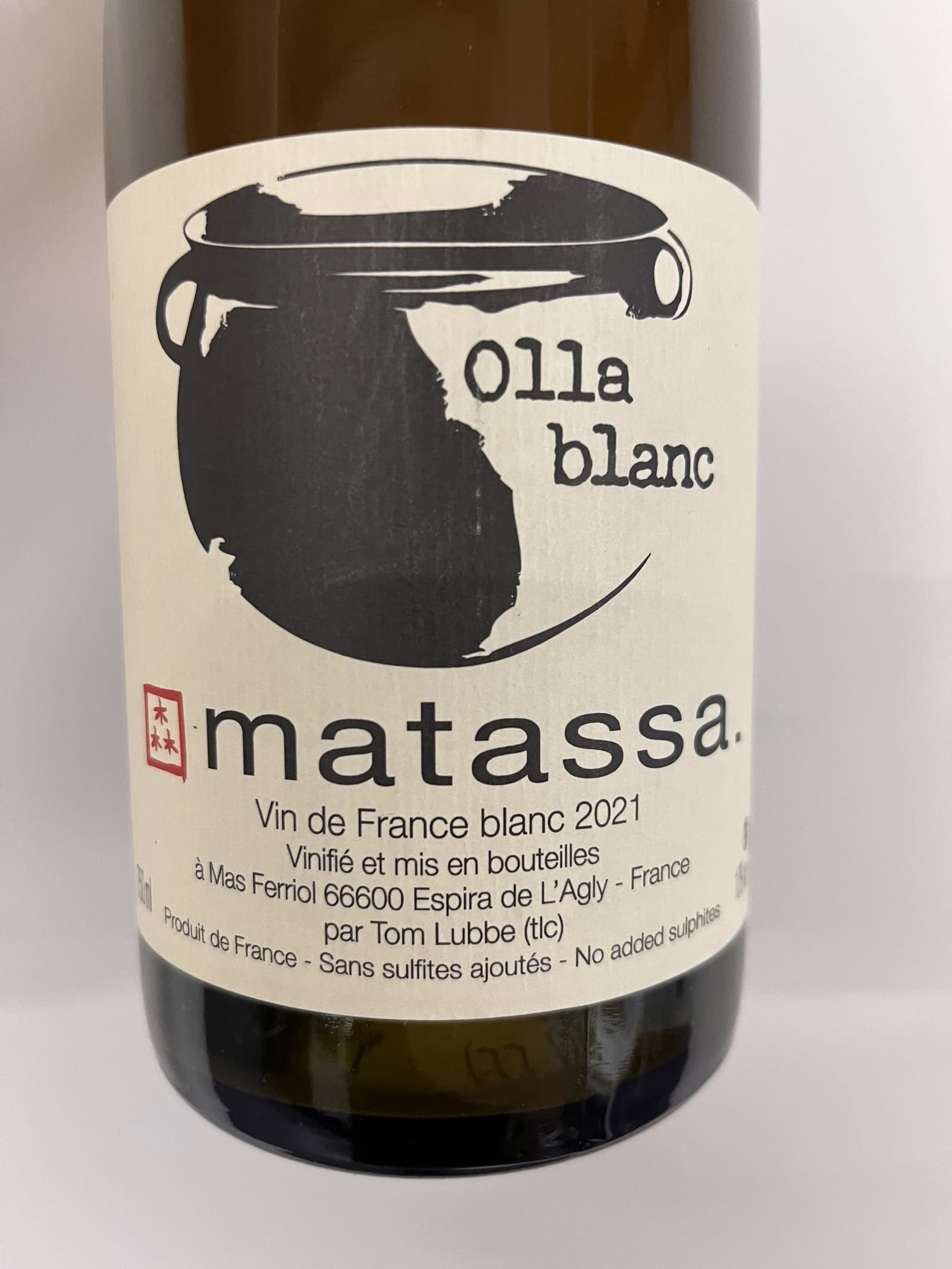Matassa Olla Blanc 2021
- Region
- France » Vin de France
- Type
- white still, dry
- Producer
- Vintage
- 2021
- Grapes
- Macabeo, Muscat of Alexandria, Muscat Blanc à Petit Grains
- Alcohol
- 10
- Sugar
- 0.4
- Volume
- 750 mL
- Cellar
- not available

This wine, named after its single vineyard origin, is a blend of Macabeo, Muscat Blanc à Petit Grains, and Muscat of Alexandria – at least, that's what Louis/Dressner suggests. However, the web offers a mix of narratives about its production. Sourced from 45-year-old vines set in lime and clay, the grapes are known to undergo a whole-cluster maceration, but the exact duration on the skins is a topic of debate. Some sources mention a two-week period, while others claim it's only one week. Fermentation and aging take place in 2,000l concrete vats. In the absence of official technical sheets, the wine's actual maceration process remains a subtle mystery, inviting us to trust our senses and the wine's own story as it unfolds in the glass.
Ratings
This wine has evolved beautifully, maintaining its funkiness while becoming smoother and more rounded. The aroma profile includes persimmon, dried herbs, wet stones, kōcha kinoko, tropical fruits, and overripe oranges. Fresh and notably deep and wide, it finishes relatively long with lingering notes of persimmon and tea. A refined and engaging experience.
A delicious beauty. A wine to consume in huge quantities without any consequences. Dried apples, kōcha kinoko, dried field flowers, and oranges from the floor with subtle yeasty touch. Medium body, fresh and flavourful. Moderately funky. Quite sophisticated and well-balanced.
How come this wine is still freely available on the Good Wine shelves? Well, better for me as this orange blend of Macabeo and Grenache is delicious and fun to drink. Moderate funkiness, just enough to make it more interesting. Dried apples, kōcha kinoko, dried field flowers, and oranges from the floor with subtle yeasty touch. Medium body, fresh and flavourful.
About Producer
At a Glance
- Tom Lubbe, hailing from New Zealand, refined his winemaking approach in South Africa, where he embraced natural techniques and an appreciation for Mediterranean varieties. His journey led him to Roussillon, where at Matassa, he's renowned for championing minimal intervention and authentically expressing the unique terroir.
- Nestled near the Pyrenees in Roussillon, Matassa is cradled by a mosaic of schist, marl, black slate, and black marl, setting a dramatic stage for the vines to thrive directly on the mother rock — a stark contrast to the topsoil-centric vineyards of neighbouring Languedoc. The domaine's treasure is its venerable vines, some witnessing over a century, and a diverse palette of grape varieties, including indigenous gems like Carignan and Macabeu, alongside less conventional picks, painting a complex portrait of flavours and textures.
- The signature of Matassa's wines lies in their elegant restraint — light, approachable, yet brimming with a quiet intensity. Each bottle encapsulates a harmonious balance, offering a juicy, vibrant, and thought-provoking sip that mirrors Tom Lubbe's personal palate.
Domaine Matassa, nestled in Calce within the Val d'Agly area of Roussillon, spans about 20 hectares of naturally tended vineyards. The vines, aging from 30 to 115 years, thrive in this unique terrain, focusing on Northern Catalunya's native varieties like Grenache Gris, Maccabeu, Muscat d'Alexandrie, Lladonner Pelut (Catalan Grenache), Carignan, and Mourvedre. The result? Wines distinct for their moderate alcohol, subtle tannins, and understated oak, marked by vibrant acidity and a profound mineral freshness.
The driving forces behind Matassa are Tom Lubbe, his spouse Nathalie Gauby, and Sam Harrop MW. Tom, a New Zealander with roots in South Africa, was mentored by Louise Hofmeyer, whose devotion to indigenous yeasts and restrained yields influenced him greatly. His curiosity about Mediterranean varietals led him to Domaine Gauby in Calce, where a brief stint in 1999 evolved into a deeper engagement, thanks to Gérard Gauby's camaraderie.
It was here, amidst the vines, that Tom and Gérard's sister, Nathalie, forged a bond, leading to marriage and the decision to lay down roots in Roussillon, giving life to Matassa in 2003 (after giving life to their first child). Their humble beginnings saw their first vintage crafted in their living room, a situation that prompted Gérard to generously offer the old Gauby cellar in 2004.
Matassa's wines are a testament to evolving practices. The vineyards, organically certified by Ecocert, eschew chemical treatments, focusing instead on cover crops that (according to Tom) have notably decreased the alcohol content from 13.5% in 2005 to 10.5% in 2018. Early harvesting, particularly of Muscat in August, and the flourishing insect life enhancing soil health, are credited (by Tom) for the nuanced flavors in their wines.
In the cellar, changes are equally pronounced. All wines are now labeled Vin de France to be free from the regulatory shackles, embracing unconventional methods like skin maceration for whites, following "Alexandria" 2008, his first macerated white; and prioritizing whole-cluster infusions over maceration for reds. Oak, if used, is for aeration, not structure, and longer elevage is bypassed in favor of capturing the wine's inherent essence sooner.
Matassa's influence extends beyond its bottles. As a beacon in the winemaking community, it attracts and mentors the next generation of vintners, all drawn by Tom Lubbe's legacy and expertise.